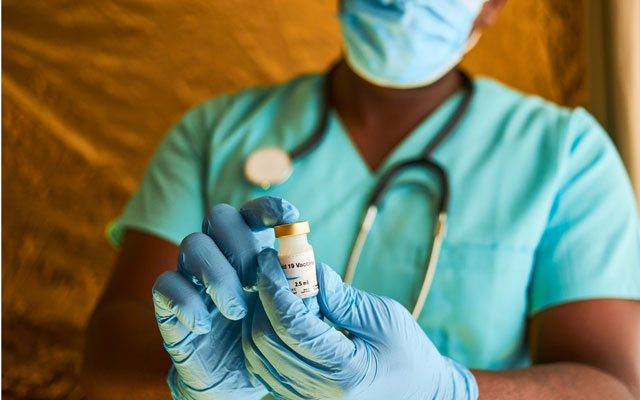
📌 Donations to COVAX for free #COVID19 vaccines
▶ US $4 billion
▶ EU $1.2 billion
▶ Germany $1.2 billion
▶ UK $734 million
📌 Uganda’s rollout plan – Phase 1
✳ Health workers 150,000 people
✳ Security 250,000
✳ Teachers 550,000
✳ Over 50s 3.348 million
✳ Below 50s with underlying conditions 500,000
Joe Biden’s US puts $4 billion into COVAX facility to enable ‘poor’ countries get vaccines
Geneva, Switzerland | JAMES FULKER, GAVI, URN & THE INDEPENDENT | A global vaccination campaign of epic proportions in history has got the funding needed to take off end of February 2021.
US President Joe Biden on Thursday announced that the United States will provide $4 billion to the vaccine alliance Gavi and World Health Organization WHO through their COVAX Facility, to support access to safe and effective vaccines for 92 low-and middle-income economies.
Biden will also urge leaders at today’s G7 meeting to release billions of extra vaccines that many countries have already ordered or stock piled. Up to 2 billion extra vaccines will be in the stores of rich countries when they finish inoculating their populations.
The two major announcements come a day after the World Health Organization (WHO) said it was seeking nearly $2 billion to fully fund its $6 million 2021 Strategic Preparedness and Response Plan for COVID-19 response.
WHO had earlier in the day also listed two versions of the Oxford-AstraZeneca vaccine for emergency use, giving the green light for these vaccines to be rolled out globally through COVAX.
The listing means that the vaccines, produced by South Korea’s SK Bioscience and Serum Institute of India (SII), have been assessed for quality, safety and efficacy.
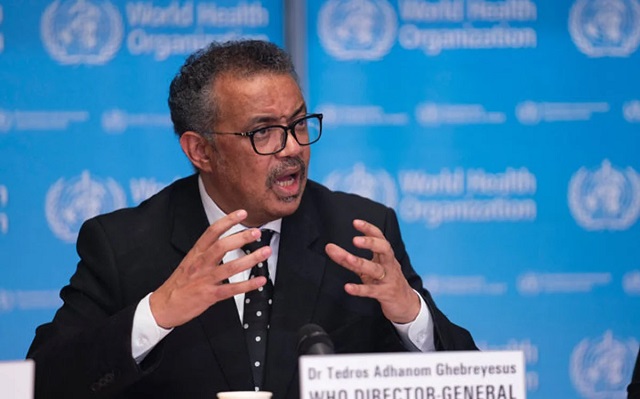
This is a key prerequisite for COVAX, which has agreements for hundreds of millions of doses of the Oxford-AstraZeneca vaccine secured for delivery to countries – both higher- and lower-income – across the world. COVAX also has 42 million doses of the Pfizer-BioNTech vaccine secured, which has already received WHO Emergency Use Listing, and will also begin deliveries shortly.
What next for COVAX, what ‘poor countries’ should do
COVAX is a multi-stakeholder group of organizations that is working on ramping up the development and manufacture of COVID-19 vaccines, and guarantees fair and equitable access for every country in the world.
This global effort is co-led by Gavi, The Vaccine Alliance, the Coalition for Epidemic Preparedness Innovations (CEPI) and the World Health Organization (WHO).
All countries lined up to receive initial COVAX vaccines, including Uganda, will now be expected to authorize use of the drugs, sign agreements and put in place certain measures. The first governments to fulfill all the requirements will get their vaccines first.
First, the national regulatory authority of each country is expected to give authorization for the vaccines. This process can also be sped up by issuing special authorisations for use based on the WHO’s Emergency Use Listing.
As is the case with all agreements vaccine manufacturers enter into, countries are required to sign indemnity agreements with manufacturers, which means governments will provide compensation to people that encounter issues with the vaccine. For lower-income countries, COVAX is offering a template agreement and establishing a fund which can be drawn from to pay compensation if required.
Lower-income countries, will receive the initial vaccines at no cost to their governments.
Before doing so they are all expected to submit National Deployment and Vaccination Plans to COVAX, which are then reviewed and validated. This process is already well underway, and has been completed for the majority of COVAX AMC participants.
In a significant step forward for the African region, national deployment and vaccination plans for COVID-19 vaccines from 35 low-income African countries eligible for free vaccines from the COVAX Facility have been accepted by an independent regional review committee.
The plans are required for countries to receive vaccines from COVAX, the global initiative to ensure fair access to COVID-19 vaccines led by WHO, Gavi, the Vaccine Alliance, and The Coalition for Epidemic Preparedness Innovations (CEPI).
Formal purchase orders must be issued by COVAX’s procurement partner UNICEF to the manufacturers, after which the doses can begin to be shipped, or flown where possible.
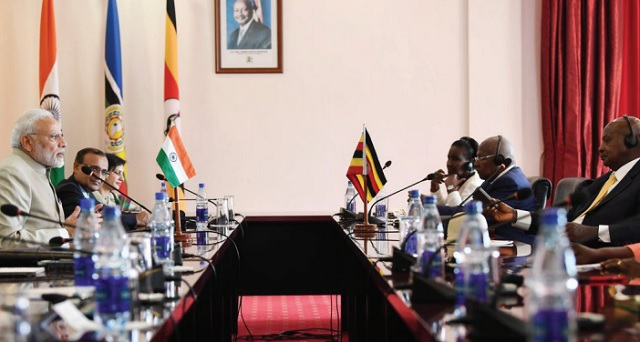
COVAX will be the largest, most rapid and complex global rollout of vaccines in history, delivering more than 2 billion doses to people in 190 economies around the world in less than a year, and ensuring no country is forced to go without because of an inability to pay.
Uganda’s plan, goes for AstraZeneca
Under the COVAX arrangement, Uganda has so far been assured of 3,552,000 doses despite them asking for 18 million. The first batch of 1,420,880 doses is expected between now and March, while the second 2,130,000 doses is expected before June.
On January 25th, Cabinet also directed Ministry of Health to order another 18 million doses to cover vulnerable people estimated at 20% of Uganda’s 45million population.
National Medical Stores has already placed the order with the Serum Instituting of India.
Uganda is also expecting a boost from China this week. China’s top diplomat Yang Jiechi is due in Qatar, Uganda and Zambia beginning this weekend.
The African union has also promised Uganda 9,150,894 doses as soon as funding is got.
Why AstraZeneca Vaccine?
Minister of Health Ruth Aceng last week explained Uganda’s choice of AstraZeneca.
“There are many vaccines molecules currently undergoing research. However, after careful scientific and logistical considerations, Uganda opted for he AstraZeneca vaccine from Serum Institute of India, because the vaccines fridges in our health facilities meet the storage temperature requirements of 2-8 degrees centigrade,” Aceng said, adding that, “It is the same reason that the Chinese vaccine is being considered for us in Uganda.”
This is contrary to newer technologies (mRNA vaccines) which require ultra-cold chain stores of -80 degrees.
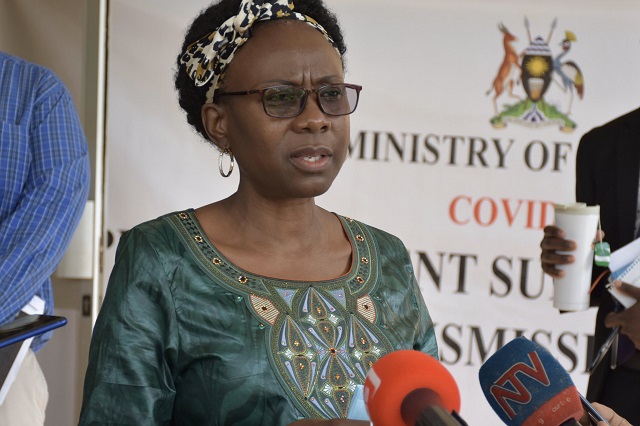
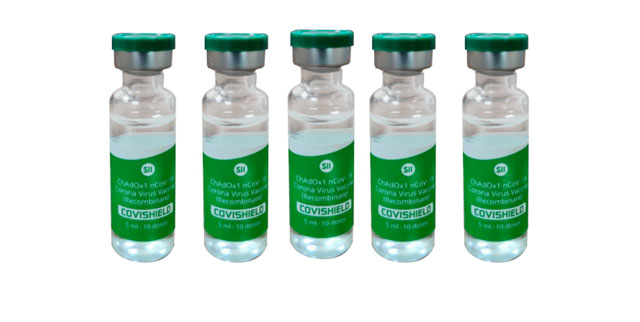
In December, the health ministry authorized the importation of 4,000 doses of the Chinese vaccine that were to be used by members of the Chinese community working in the Liao Shen Industrial Park Kapeeka. The effects of the vaccine are still unknown.
Apart from the government, also private companies in Uganda have started sealing deals with global pharmaceuticals booking for access partnerships. One of such companies is the Lugogo based Abacus Pharma where it’s Executive Director Rajaram Sankaram told URN they are already in talks with Russian Authorities to be able to distribute their vaccine in Uganda.
How COVAX will work
Since most developing countries cannot compete on an open market for the COVID-19 vaccines, World Health Organization has planned joint purchases for these nations in an initiative that also has vaccines alliance GAVI and CEPI- Coalition for Epidemic Preparedness Innovations – a global coalition to fight epidemics
This is supported by funds from wealthy nations in a program dubbed COVAX, one of three pillars of the Access to COVID-19 Tools Accelerator that focusses on developing a COVID-19 vaccine.
It is seen as the only global solution to the pandemic which will ensure that people in all corners of the world will get access to COVID-19 vaccines once they are available, regardless of their wealth.
A total of 156 economies representing nearly two-thirds of the world’s population have joined the COVAX Facility. This includes 64 higher-income economies, which are self-financing in procuring COVID-19 vaccines once available, and 92 low- and middle-income economies eligible for support for the procurement of vaccines through the COVAX Advance Market Commitment (AMC) coordinated by the Gavi, the Vaccine Alliance, a financing instrument aimed at supporting the procurement of vaccines for these countries
Uganda on list of 92 countries to benefit from COVAX AMC
In July the GAVI Board agreed on the 92 economies that will be supported the COVAX Advance Market Commitment (AMC).
- Low income: Afghanistan, Benin, Burkina Faso, Burundi, Central African Republic, Chad, Democratic Republic of the Congo, Eritrea, Ethiopia, Gambia, Guinea, Guinea-Bissau, Haiti, Democratic People’s Republic of Korea, Liberia, Madagascar, Malawi, Mali, Mozambique, Nepal, Niger, Rwanda, Sierra Leone, Somalia, South Sudan, Syrian Arab Republic, Tajikistan, Togo, Uganda, United Republic of Tanzania and Yemen.
- Lower-middle income: Angola, Algeria, Bangladesh, Bhutan, Bolivia, Cabo Verde, Cambodia, Cameroon, Comoros, Congo, Côte d’Ivoire, Djibouti, Egypt, El Salvador, Eswatini, Ghana, Honduras, India, Indonesia, Kenya, Kiribati, Kyrgyztan, Lao People’s Democratic Republic, Lesotho, Mauritania, Micronesia, Moldova, Mongolia, Morocco, Myanmar, Nicaragua, Nigeria, Pakistan, Papua New Guinea, Philippines, São Tomé and Principe, Senegal, Solomon Islands, Sri Lanka, Sudan, Timor-Leste, Tunisia, Ukraine, Uzbekistan, Vanuatu, Vietnam, West Bank and Gaza, Zambia and Zimbabwe
- Additional IDA eligible: Dominica, Fiji, Grenada, Guyana, Kosovo, Maldives, Marshall Islands, Samoa, St. Lucia, St. Vincent and the Grenadines, Tonga and Tuvalu.
No one is safe until everyone is safe. #COVID19 @washingtonpost pic.twitter.com/myjnuVWTRi
— Tedros Adhanom Ghebreyesus (@DrTedros) November 29, 2020
GAVI, the Vaccine Alliance, is a public-private partnership that helps vaccinate half the world’s children against some of the world’s deadliest diseases. (see WHO deployment plan at bottom)
HOW COVAX WORKS
WHO vaccine deployment plan
WHO 2019 NCoV Vaccine Deployment 2020 by jadwongscribd on Scribd
VIDEO FROM Serum Institute
 The Independent Uganda: You get the Truth we Pay the Price
The Independent Uganda: You get the Truth we Pay the Price



